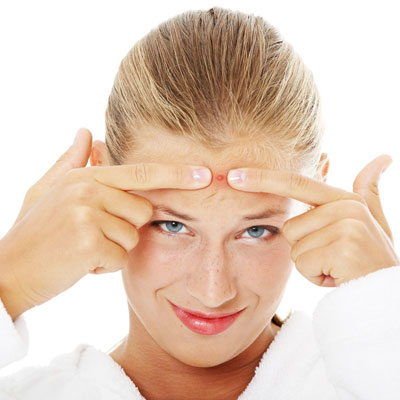
Before you start to treat your acne it is important to establish just what sort of acne you are suffering from because, despite common belief, all acne is not the same.
Before you can treat your acne it is vital to know just what sort of acne you have because, despite what many of us think, acne can be more than a simple case of spots caused by trapped skin oil (sebum), dead skin cells, white blood cells and bacteria.Acne is often classified by grade starting with grade I which includes mild, non-inflamed forms of acne such as blackheads and whiteheads. From here we move to grade II acne which involves cases of acne with a large number of blackheads and whiteheads and generally also includes papules or pustules which are mildly inflamed. A papule is a small lesions, or break in the skin, which appears as a bump that rises above the surface of the skin and is normally smaller than about 5 mm across. A pustule is very similar to a papule but is pus-filled and contains a mixture of dead skin cells, white blood cells and bacteria.Next on the scale come grade III acne which is simply a more severe case of grade II acne in which the papules or pustules are red, larger and more numerous.Finally, we come to grade IV acne which is the most severe case of acne and includes nodules and cysts. Inflammation in the case of grade IV acne is normally wide spread and grade IV acne generally encompasses more than simply the face.Grade I acne, which includes the common form of mild acne known as acne vulgaris, is not normally difficult to treat and can generally be cleared up with over-the-counter medications.A more severe form of acne is acne congoblata which is characterized by heavy inflammation and deep abscesses which can frequently result in scarring and other forms of skin damage. Inflamed and often painful nodules form around comedones (a medical term for mild acne spots) and will often grow until they spontaneously discharge pus. This type of acne can often result in keloid-type scarring.Acne fulminans is another form of acne in which nodules will often ulcerate, resulting in a painful and recurrent form of acne. Sufferers can also sometimes run a fever and experience aching joints and treatment with corticosteroids or non-steroidal anti-inflammatory drugs is normally required. Such drug treatments are however designed to treat the symptoms of this form of acne and not its underlying cause.Continuing on up the scale some people will develop nodulocystic acne. Unusual cysts (red bumps caused by severe inflammation) form and occasionally they become so numerous and appear close enough together to create a fairly large area of inflammation. Nodulocystic acne can form small tunnels below the surface of the skin allowing infection to spread easily and quickly. This form of acne is generally treated using antibiotics and a commonly used drug treatment is isotretinoin, which many people will know by the name of Accutane.Finally, we come to gram-negative folliculitis which occurs when hair follicles become infected. Bacteria growing at the base of a hair follicle cause the body to respond by sending white blood cells to fight the infection and this can occasionally result in a deep eruption which requires special treatment. This particular form of acne is often resistant to treatment with antibiotics and indeed the condition can sometimes by causes by using antibiotics to treat other forms of acne.Although extremely common, acne is not the simple condition which many of us have always thought it to be and it is not always a simple case of buying a cream from the corner drugstore to treat it. So, as soon as acne appears pop along to your doctor, or better still a professional dermatologist


Do You Want to Get of Your Acne? Try a Diet for Acne
If you're a victim of acne vulgaris, usually just known as acne, you're constantly worrying about how to get rid of those pesky red bumps on your face, back, or chest.� I know, because I've been there.� If you're like me, you've probably taken (or are considering) prescription drugs, prescription topical medications, and other harmful substances to get rid of your acne quickly.� I don't blame you, but that's not always the best way to go about getting rid of acne.� The problem is, these medications usually have a harmful effect on the rest of your body, even if they are effective on your acne.�
Read More
Do You Hate Acne?
Do you hate acne? Acne sufferers are usually frustrated with their acne issues. If your acne has developed fully it is going to take some time before you will see results from your acne treatment. If it has only just started to appear following an acne treatment plan will bring positive results quicker.
Read More
Teenagers and Acne
Acne seens to be a name that people of a younger and younger age know all to well. The author talks about acne in teenagers and the fact that if not taken care of properly, acne can produce acne scars. She gives advice on products and ingredients so that no one has to experience what happens when acne is not treated.
Read More
Three Acne Treatments You Need to Use Right Now to Clear Your Acne
There are several acne treatments that are effective for many acne sufferers.� However, I don't recommend all of them because some are simply too expensive or too risky.� For instance, laser treatments work well for acne and acne scars, but one visit can cost upwards of $300.� Many dermatologists prefer to give their patients oral contraceptives, which are effective for some, but can actually make acne worse for others.� It also has a tendency to cause weight gain.
Read More
This Article was written by : Donald Saunders, Discuss about Health Articles, it was published at May 29, 2008 and was updated at
Comments
Post a Comment